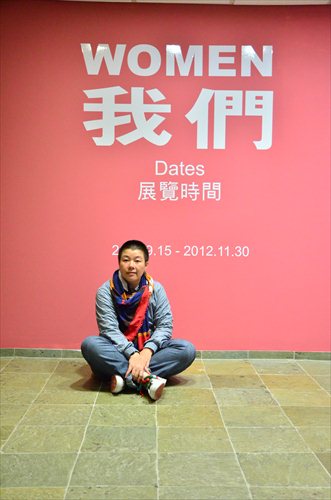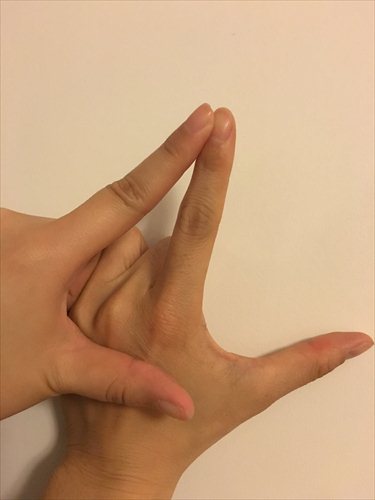

Lesbian dating shanghai - the same

Chen Xiangqi, the founder of the Shanghai lesbian group Nüai, helps organize activities. Photo: Courtesy of Nüai
In July, Wan Qing shocked many Chinese people by coming out and admitting she was a lesbian at her graduation ceremony at the Sun Yat-sen University in Guangdong Province. The young woman waved a rainbow flag (a symbol of the LGBT - lesbian, gay, bisexual and transgender) in front of the graduation venue and called for equal rights for LGBT people. Her actions created a furor on the Internet.
One month later, a 21-year-old lesbian couple in Jilin Province held a wedding ceremony at a local bar and this also stirred an intense public debate online.
For decades China's lesbians have been almost invisible. They seldom appear in media, and there are few lesbian support organizations. According to a report in the Shandong-based Metropolis Ladies Newspaper in 2011 there were only 28 nonprofit lesbian organizations in China (campus groups excluded).
The Nüai group in Shanghai was established in 2005 and is the only recognized local nonprofit group that supports and helps lesbians today.
A high school affair
Chen Xiangqi is the founder of Nüai. The 40-year-old discovered her sexual inclinations in high school, when she fell in love with one of her roommates who responded in kind. "We often shared a bed and kissed each other," she said. "When we had to separate for summer vacations we kept writing to each other and the letters I wrote were just like the letters a boyfriend would write to a girlfriend."
The two schoolgirls naively believed at the time that they were no more than close friends and they would have less attachment to each other after finding boyfriends. "Then just before graduation she got a boyfriend, and that made me depressed and jealous," Chen said. Though at that time Chen had lots of male admirers she didn't want to date any of them. "I wasn't in love with boys."
It wasn't until the late 1990s as the Internet developed in China that Chen read about homosexuality. One day in 1999 she came across an online QQ chat room - "a chat room for lesbians" - and began, out of curiosity, talking to others on the site, most of whom insisted that they themselves were not lesbians. "In those days we were too cautious to come out - even to strangers online," Chen said.
Chen decided to create an online community for lesbians on her own. In 2001, she launched the lesbian website Lescn and regularly posted foreign media reports about lesbians and gays there. Gradually an increasing number of LGBT people learned about the website and by 2006 there were more than 60,000 registered users. But because of a lack of funds, Lescn was shut down in 2006.
Although more and more lesbians began sharing their experiences and thoughts online, there were few actual gatherings where they could meet face to face. "It was really hard to find a lesbian in real life at that time," Chen said. In 2005 there was just one public lesbian organization in China and that was in Beijing. "That inspired me to create a similar offline group for lesbians in Shanghai."
That year Chen founded Shanghai's first nonprofit lesbian-help organization, Nüai (literarily "women's love"), with the help of some LGBT friends and began organizing regular events for lesbians in Shanghai including discussions and LGBT film nights. The unregistered, grass-roots group had no full-time staff but dozens of unpaid volunteers.
Pouring out
In Nüai's first two years, Chen and coworkers opened a hotline offering advice for lesbians and their families. The hotline initially was only open for two hours on Friday evenings and it received an average of three calls a session - but many of the calls lasted for more than half an hour. "They had a lot to pour out," Chen said.
She remembered one call from a mother in a small city in inland China. The woman's daughter was a lesbian but she had just married a man. She knew her daughter was very unhappy and wanted to encourage her to divorce. "But we are in a small city where people don't understand about lesbians," she told Chen. "I'm afraid that if my daughter got divorced and came out, she would suffer greatly at the hands of relatives and colleagues."
When Chen told her that there were many lesbians in Shanghai and they often got together and talked to each other, the mother said she was delighted to learn that. "It's good to know that my daughter is not alone - in China there are so many people like her."
This was a rare, reasonable mother who didn't blame her daughter for her sexual orientation. "Unfortunately most of the time Chinese parents get angry when they learn their children are homosexuals," Chen told the Global Times.
One day a 20-something woman called the Nüai hotline, crying. The parents of her girlfriend had discovered she was a lesbian and had locked her inside their house. "I don't know what to do now," the young woman sobbed. "Should I try to get her out of the house and elope with her?"
In 2014, a Shanghai mother pushed her way into the apartment where her daughter was living with her girlfriend and started breaking things there, screaming and attacking the girlfriend. Nüai member Wang Kunshou said the mother later tried to create havoc at the firm where her daughter was employed and even caused a disturbance at a local police station.
"I have seen too many parents cry, argue and even threat to kill themselves when their kids came out," Wang said. "They think it's monstrous to have a homosexual child."
Wang is a lesbian. The 37-year-old had suffered constant questioning from her family about when she was going to get married until she "married" a gay man in 2014 and showed her parents a fake marriage certificate. "In China many homosexuals aged between 27 and 36 choose marriages of convenience just to satisfy their families," she told the Global Times.
Though Wang's parents don't live in Shanghai, they have been pushing Wang to have a baby. And, Wang said, they are thinking of moving to Shanghai soon. "That will make it harder for me to fool them."
Wang grew up in a family in northeastern Liaoning Province. As a child she always dressed liked a boy. "I hated skirts," she said, "but my mother often forced me to wear them." For a long time Wang had to wear skirts but she wore boy's pants underneath, and the minute she got to school she took off the skirts.
By the eighth grade Wang realized she was attracted to girls. She liked to hug the girls in her class and kiss them on their cheeks and necks. She did try to go out with a boy once but the experience made her feel very uncomfortable. "Then I was certain that I only really loved girls," she said.
After graduation Wang came to Shanghai and in 2006 joined Nüai. In those days most of the Nüai functions were held in secret and members would gather in small bars and in rooms with a letter "L" pinned to the door.
More recently as public acceptance of lesbians had grown Nüai has been organizing LGBT-themed lectures and discussions that are open to the public. But there can still be problems. Four years ago Nüai planned an event with other LGBT-friendly organizations on a two-day gathering, but it was officially cancelled before it could begin. "I don't know how the government knew about it," Chen said.

Ellen and Isabel make an L sign with their hands - they are keen to have the same legal rights that other couples enjoy. Photo: Courtesy of Isabel
Unfriendly companies
Apart from regularly organizing events for lesbians, in 2014 Nüai surveyed dozens of State-owned, private and foreign-funded companies in Shanghai. Sponsored by the British Consulate in Shanghai, the survey concluded that local companies were not friendly to their LGBT workers. Only 17.1 percent of these companies had drafted LGBT-friendly policies, like giving homosexuals who have had a "wedding ceremony" a honeymoon vacation, the survey showed. The most LGBT-friendly companies were foreign.
Because of these negative attitudes most LGBT people hide their sexual orientations at work. According to a 2013 survey by the Aibai Culture & Education Center, a domestic nonprofit LGBT-supporting organization, only 6.29 percent of the respondents had revealed their sexual orientations at work.
Ellen (pseudonym) is a lesbian who has kept this secret at work. Employed in the manufacturing industry in Shanghai, the 34-year-old said her company managers thought anyone aged 30 or more who wasn't married was unreliable. "And I understand that some companies in this industry will investigate your personal life before assigning you an important task, including checking your family background and marriage status," she told the Global Times. She tells her work colleagues that she has a boyfriend, although they haven't married yet.
In fact Ellen has a long-term girlfriend, Isabel (pseudonym), who is a 34-year-old Shanghainese woman and a Nüai member. They met in college, fell in love and have lived together for 14 years.
Like Wang, Isabel also had a marriage of convenience with a gay man around 2012. But her marriage certificate was genuine - she and the man registered at local civil affairs department and legally became husband and wife. "At first I didn't want to register, either," she said. "But the company that my 'husband' works for often checks its employees' personal information. He didn't dare claim to be married to his boss without a real marriage certificate."
While Isabel and Ellen are living together Isabel occasionally brings her "husband" to her parents' home for dinner. "We pretend to be a normal couple," she told the Global Times. When her parents ask when they will have a baby she tells them she doesn't like children.
Though she was worried about the pressures and opposition she might face, in 2012 Ellen told her mother and father she was a lesbian. Although her father wasn't angry her mother could not accept the revelation. "There were times when my mother woke up every morning crying about me being a lesbian," Ellen said. "She forced me to wear skirts and arranged lots of blind dates for me. I was worried she was very depressed."
More relaxed
Even today, Ellen's mother still asks her that when she will get married. "It is taking time to persuade her," she said. But she doesn't regret coming out to her parents. "In front of them I feel much more relaxed than before - I don't have to pretend."
In 2013, Ellen and Isabel bought a house in Songjiang district using Ellen's public housing fund - they are not eligible for a married couple's publicly-funded mortgage. As a consequence only Ellen's name appears on the property deeds even though Isabel has contributed her share to the house.
"I know that we do need a marriage certificate," Ellen said, adding that they were keen to have the same legal rights that other couples in the country enjoyed. "For example, if Isabel gets ill one day and has to have an operation I wouldn't be able to sign her authorization form. That's terrible." Both Ellen and Isabel have written wills to ensure that if either passes away suddenly the other will inherit her property.
Newspaper headline: The invisible women

-
-